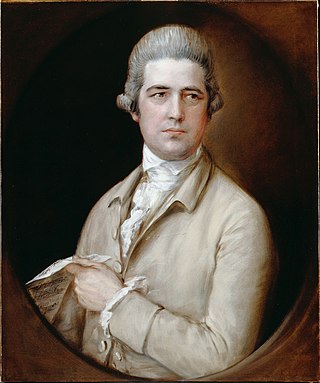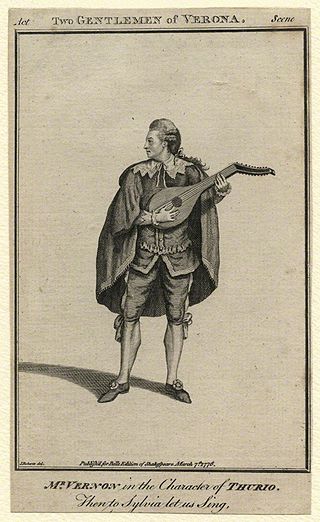
Thomas Linley was an English bass and musician active in Bath, Somerset. Born in Badminton, Gloucestershire, Linley began his musical career after he moved to Bath at age 11 and became apprentice to the organist Thomas Chilcot. After his marriage to Mary Johnson in 1752, Linley at first supported his wife and growing family predominantly as a music teacher. As his children grew and he developed their musical talent, he drew an increasing amount of income from their concerts while also managing the assembly rooms in Bath. When the new Bath Assembly Rooms opened in 1771, Linley became musical director and continued to promote his children's careers. He was eventually able to move to London with the thousands of pounds which he had amassed from their concerts.

Michael Kelly was an Irish tenor, composer and theatrical manager who made an international career of importance in musical history. One of the leading figures in British musical theatre around the turn of the nineteenth century, he was a close associate of playwright and poet Richard Brinsley Sheridan. He also became friends with musicians such as Mozart and Paisiello, and created roles for the operas of both composers. With his friend and fellow singer Nancy Storace, he was one of the first tenors of that era from Britain and Ireland to become famous in Italy and Austria. In Italy he was also known as O'Kelly or even Signor Ochelli. Although the primary source for his life is his Reminiscences, doubt has been cast on the reliability of his own account, and it has been said that '[a]ny statement of Kelly's is immediately suspect.'

Stephen John Seymour Storace was an English composer of the Classical era, known primarily for his operas. His sister was the famous opera singer Nancy Storace.

Sir Henry Rowley Bishop was an English composer from the early Romantic era. He is most famous for the songs "Home! Sweet Home!" and "Lo! Hear the Gentle Lark." He was the composer or arranger of some 120 dramatic works, including 80 operas, light operas, cantatas, and ballets. Bishop was Knighted in 1842. Bishop worked for all the major theatres of London in his era – including the Royal Opera House at Covent Garden, the Theatre Royal, Drury Lane, Vauxhall Gardens and the Haymarket Theatre, and was Professor of Music at the universities of Edinburgh and Oxford. His second wife was the noted soprano Anna Bishop, who scandalised British society by leaving him and conducting an open liaison with the harpist Nicolas-Charles Bochsa until the latter's death in Sydney.

James Hook was an English composer and organist and a friend of Joseph Haydn and Muzio Clementi.

AnnaSelina Storace, known professionally as Nancy Storace, was an English operatic soprano. The role of Susanna in Mozart's Le nozze di Figaro was written for and first performed by her.

No Song, No Supper is an opera with music by Stephen Storace to a libretto by Prince Hoare.

Gli equivoci, is an Italian opera buffa by Stephen Storace to a libretto by Lorenzo Da Ponte, based on Shakespeare's The Comedy of Errors.
Thomas Shaw, also known as Thomas Shaw Jun(ior, was an English violinist, violist, clarinettist and composer who was born c.1752, probably in Bath, and who probably died in Paris on 28 June 1827 or c.1830. Thomas Shaw was the son of Bathonian musician Thomas Shaw and the younger brother of violinist Anthony Shaw. The majority of his career was spent at the Drury Lane theatre in London as an instrumentalist, violin soloist, band leader, musical director and in-house composer.
William Reeve was an English theatre composer and organist.
William Michael Rooke was an Irish violinist and composer.

John Bannister was an English actor and theatre manager. The principal source for his life are his own Memoirs, and as a leading performer his career is well documented.

Dido, Queen of Carthage was an opera in three acts by Stephen Storace. Its English libretto by Prince Hoare was adapted from Metastasio's 1724 libretto, Didone abbandonata, which had been set by many composers. Storace's opera premiered on 23 May 1792 at The King's Theatre in London combined with a performance of his masque, Neptune's Prophecy. The story is based on that of Dido and Aeneas in the fourth book of Virgil's Aeneid. The opera was not a success and was never revived after its original run of performances. The score has been lost.
James Cobb (1756–1818) was an English librettist. He provided texts for the opera composers such as Stephen Storace, and Lord Burghersh.
The Siege of Belgrade is a comic opera in three acts, principally composed by Stephen Storace to an English libretto by James Cobb. It incorporated music by Mozart, Salieri, Paisiello and Martini, and is therefore considered a pasticcio opera, as well as a Singspiel in English language, as it contained a spoken dialogue. It premiered on 1 January 1791 at the Theatre Royal, Drury Lane, in London with a great success, featuring many famous singers and actors of the time, such as sopranos Nancy Storace and Anna Maria Crouch, tenor Michael Kelly as well as Shakespearean actors with singing skills such as John Bannister and Richard "Dicky" Suett.

Joseph Vernon was an English actor and singer. From his days as a boy soprano, he had a successful career on the London stage, interrupted only by the aftermath of an underage wedding to a colleague.
The Haunted Tower is an opera composed by Stephen Storace to a libretto by James Cobb. It was first performed in London at the Theatre Royal, Drury Lane on 24 November 1789. It was one of Storace's more popular works, remaining among Drury Lane's repertoire for 30 years. The printed vocal score went through five editions, attesting to its popularity.
Arsinoe, Queen of Cyprus by Thomas Clayton was the first Italian-style opera to be staged in England. It premiered at the Theatre Royal, Drury Lane on 16 January 1705. There were various historical women named Arsinoe, but from the mid seventeenth-century the name became popular for fictional characters who, like the title-role of this opera, bore no relation to any of them.

Gli sposi malcontenti is an opera buffa in 2 acts composed by Stephen Storace to an Italian libretto by Gaetano Brunati.









